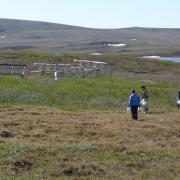Welcome to the Arctic Long Term Ecological Research (ARC LTER) site, part of a network of sites established  by the National Science Foundation to support long-term ecological research in the United States. Our research site is located in the foothills region of the Brooks Range, North Slope of Alaska (68° 38'N 149° 36.4'W elevation 720 m) and is based out of the University of Alaska's Toolik Field Station. The project is based year-round institute at The Ecosystems Center, Marine Biological Laboratory, Woods Hole, Massachusetts. The Principal Investigator of the Arctic LTER is Ed Rastetter while Breck Bowden, Laura Gough, Phaedra Budy, George Kling, Gus Shaver, Anne Giblin and Byron Crump form an executive committee and direct the four main components of the research including groups focused on tundra, streams, lakes, and landscape interactions. Project History: Research at Toolik Lake began in 1975, and the site became part of the LTER Network in 1987. The overall aim of the ARC-LTER has been to develop a landscape understanding of ecological functioning based on the interactions among tundra, stream, and lake ecosystems near Toolik Lake, Alaska. The specific focus evolves continuously and changes with each renewal cycle, as understanding has grown and as new opportunities and questions are recognized:
by the National Science Foundation to support long-term ecological research in the United States. Our research site is located in the foothills region of the Brooks Range, North Slope of Alaska (68° 38'N 149° 36.4'W elevation 720 m) and is based out of the University of Alaska's Toolik Field Station. The project is based year-round institute at The Ecosystems Center, Marine Biological Laboratory, Woods Hole, Massachusetts. The Principal Investigator of the Arctic LTER is Ed Rastetter while Breck Bowden, Laura Gough, Phaedra Budy, George Kling, Gus Shaver, Anne Giblin and Byron Crump form an executive committee and direct the four main components of the research including groups focused on tundra, streams, lakes, and landscape interactions. Project History: Research at Toolik Lake began in 1975, and the site became part of the LTER Network in 1987. The overall aim of the ARC-LTER has been to develop a landscape understanding of ecological functioning based on the interactions among tundra, stream, and lake ecosystems near Toolik Lake, Alaska. The specific focus evolves continuously and changes with each renewal cycle, as understanding has grown and as new opportunities and questions are recognized:
- ARC-LTER I (1987-1992): Descriptions of tundra, stream, and lake ecosystems; long-term change versus short-term controls on ecosystem components.
- ARC-LTER II (1992-1998): Ecological variability and long-term change; top-down versus bottom-up controls on tundra, streams, and lakes.
- ARC-LTER III (1998-2004): Prediction of the future characteristics of arctic ecosystems and landscapes; controls by physical, climatic, and biotic factors. (1998 proposal)
- ARC-LTER IV (2004-2010): Understanding changes in the arctic system at catchment and landscape scales through knowledge of linkages and interactions among ecosystems. (2004 proposal)
- ARC-LTER V (2011-2017): Understanding changes in the arctic system resulting from (i) direct effects of climate change on states, processes, and linkages of terrestrial and aquatic ecosystems, and (ii) indirect effects of climate change on ecosystems through a changing disturbance regime. (2010 proposal)
- ARC-LTER VI (2018-2023): The role of biogeochemical and community openness in governing arctic ecosystem response to climate change and disturbance (2016 proposal) .
The Arctic is rapidly warming. Some responses to this warming involve acceleration of processes common to other ecosystems around the world (e.g., shifts in plant species), whereas others are unique to the Arctic but with global consequences for society (e.g., carbon loss from permafrost thaw). The objectives of the Arctic Long-Term Ecological Research (ARC-LTER) project for 2023-2029 (2022 proposal) are to determine how and how fast trends in climate change and especially climate variability are changing arctic ecosystem structure and function.
These objectives will be met through continued long-term monitoring of changes in undisturbed and disturbed ecosystems along the terrestrial to aquatic continuum in the vicinity of Toolik Lake, Alaska. In addition, we measure the recovery of these ecosystems from natural or imposed disturbances and maintain existing long-term experiments.
Through a combination of data analysis and modeling we will assess how climate change and climate variability will affect biogeochemistry and community dynamics of ecosystems, and determine how ecosystem responses will propagate across the landscape.
We have three overarching research questions:
Q1. How does climate variability affect the openness and connectivity of arctic ecosystems?
Q2. How does climate variability affect key consumers and their influence on ecosystems?
Q3. How does climate variability affect carbon dynamics along the terrestrial-aquatic continuum?
These are separate questions but together they integrate our research across the terrestrial-aquatic continuum.

